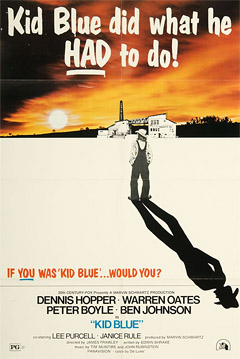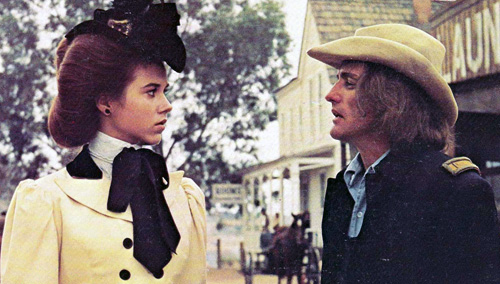Lone Star Cinema: Kid Blue

"Of all liars, the smoothest and most convincing is memory."* I saw Kid Blue at the Paramount during Austin Film Festival 1997, and I remember a lively, responsive audience that loved a very weird and very funny movie from 1973. Afterward, the film's star Dennis Hopper and screenwriter (and Austin author) Bud Shrake had a rollicking good time onstage telling crazy stories about shooting the movie in Mexico.
I've been encouraging people to get their hands on the movie ever since, but it's not on DVD or Blu-ray and it hasn't been screened in Austin since AFF. Fortunately, it's available online via Amazon, although the picture/sound quality is not stellar.
Over the past 17 years (damn, it cannot have been that long), I overhyped myself on Kid Blue. But it's a fascinating movie, if not as funny as I remembered it. As a 1970s oddity, the counterculture Western falls somewhere between the barely comprehensible Eggshells (Tobe Hooper's first feature, read Don's review) and a movie I like far more than it deserves, Harry and Walter Go to New York.
The counterculture Western opens with a botched train robbery by a gang that includes Bick (Hopper), aka the notorious Kid Blue. Sick of the outlaw life, he decides to go straight and get a legitimate job, and he ends up in the small Texas town of Dime Box.
And it is in Dime Box (the movie's original title, incidentally) that this long-haired ex-bandit encounters The Man, in all his incarnations. All Bick wants to do is lead a normal, law-abiding life, but Sheriff "Mean John" Simpson (Ben Johnson) is automatically suspicious, and other self-important townsmen dismiss and belittle him as a clumsy, naive hoodlum. (Hopper was in his thirties at the time, but he looks like a baby.) He finds a potential friend in Reese (Warren Oates), but his wife (Lee Purcell) seems a little too friendly.
Kid Blue may be set in the early 20th century (it's a bit vague on that point) but the attitudes are pure 1973, with the more pious townspeople spouting cliches about patriotism, the unemployed/poor bringing it on themselves, young men needing to learn respect for their elders, and native Americans being "savages." The local preacher has an interesting drug habit, and the town's Native Americans are continually smoking something mind-altering.
In fact, every character in Kid Blue is an archetype for 1970s Americans making life harder for that guy who just wants to be happy and free: the bigoted lawman, the patriotic businessman, the pompous lout, the self-styled intellectual, the fresh-faced female hypocrite, the preacher who tries to be (literally) uplifting. Unfortunately, the Native American characters are not archetypes but stereotypes -- seemingly childlike but ultimately wise (see also: Spike Lee's definition of the Magical Negro).
It's a treat to watch the supporting cast in this film, led by Warren Oates as the factory worker who wants to live just like the ancient Greeks. Peter Boyle shines as Preacher Bob, an ex-engineer with a sideways attitude about the Lord. Ben Johnson could have played a stock lawman like Mean John in his sleep, but does so with great gusto. Jack Starrett, the veteran actor (he played Gabby in Blazing Saddles the following year) and director (Cleopatra Jones, The Dion Brothers), has a brief role as a nasty visiting gunman. Hopper's character is more of a cypher than you would expect from the actor if you're a fan of his later-career roles.

Kid Blue may not be the raucous comedy I remembered, but it's still worth your while, especially if you are a fan of Bud Shrake's work. I strongly recommend this 1985 Austin Chronicle interview with Shrake, which includes a few anecdotes about Kid Blue (the producer became a Buddhist monk shortly after finishing the movie).
Where to watch: You can rent Kid Blue online from Amazon. Before Shrake's death in 2009, he recorded a commentary track for this film, and it was rumored that Richard Linklater would be producing a home video release of the film. I still hope that'll happen. Also, would some Austin theater or festival please track down a print (AFF allegedly got the one they showed in Australia) and screen it? I'd love to watch it with an audience again.
Austin/Texas connections: Screenwriter Bud Shrake lived in Austin for many years. Director James Frawley (who also directed The Muppet Movie) is a native of Houston. Jack Starrett is a Texas native. The movie is set in Dime Box, with references to Dallas, Fort Worth and even Austin ... but it was shot in Mexico.
*The quote at the top is credited to Olin Miller -- I lifted it from Harlan Ellison's introduction to Harlan Ellison's Watching. Ellison's film essays have been so influential on my film tastes and writing that I couldn't resist including the reference in my last piece for Slackerwood.


Kid Blue
Kid Blue is available on DVD from the Fox Cinema Archive, but it's the same cruddy pan and scan version you see on Amazon. Avoid it.
There is a widescreen version available on a Spanish DVD so it's worth looking for that. But what it really needs is a total remaster and release on Blu-ray.